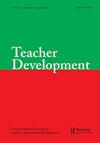影响教师对服务残障中学生认知的因素
IF 1.1
Q3 EDUCATION & EDUCATIONAL RESEARCH
引用次数: 0
摘要
摘要中学残障学生需要循证实践来促进他们的学业成功。然而,中学教师可能会觉得没有准备好支持中学社工,这可能会降低他们实施循证实践的可能性。因此,作者调查了几个职前和在职支持因素对普通教育和特殊教育教师对循证方法的认知的影响,以及在美国哪里可以获得有关服务中等社会福利人士的有效方法的信息。他们的二次分析显示,多种因素与更高水平的感知知识有关,例如参与教师培训计划,充分关注社会福利人士,无论教师类型如何。而其他因素,如特殊教育认证,与教师感知知识无关。鉴于感知知识对教师实施的影响,这些发现对研究人员、教师教育者以及学校和地区管理者具有重要意义。关键词:中等教育循证教学教师培养专业发展披露声明作者未报告潜在利益冲突。本研究得到了兰德美国教育专家小组的支持。作者简介alexandra Shelton是约翰霍普金斯大学特殊教育系的助理教授。她的研究兴趣包括通过基于证据的识字指导和干预以及教师专业发展和辅导,改善历史上边缘化的残疾青少年和阅读困难的读写能力。作为一名前高中特殊教育教师,亚历山德拉在英语语言艺术、阅读、数学和科学等普通和特殊教育环境中为学生提供服务。Brennan RegisterBrennan Register是马里兰大学帕克分校定量方法论:测量与统计专业的博士生。凭借在统计分析方面的坚实基础,她在匹兹堡大学成功完成统计学硕士学位后加入马里兰大学。布伦南的研究在于将尖端的统计方法应用于复杂的教育数据。她特别感兴趣的是研究多层次和标准预测算法在大规模教育数据集上的性能,并努力在数据驱动的教育决策领域产生有意义的影响。本文章由计算机程序翻译,如有差异,请以英文原文为准。
Factors associated with teachers’ perceived knowledge regarding serving secondary students with disabilities
ABSTRACTSecondary students with disabilities (SWDs) require evidence-based practices that promote their academic success. However, secondary teachers may feel unprepared to support secondary SWDs, which may reduce their likelihood of implementing evidence-based practices. Therefore, the authors investigated the influence of several preservice and in-service support factors on general and special education teachers’ perceived knowledge of evidence-based methods and where to access information on effective methods for serving secondary SWDs in the United States. Their secondary analysis revealed that multiple factors are associated with higher levels of perceived knowledge, such as participation in teacher preparation programs with an adequate focus on SWDs, regardless of teacher type. However, other factors, such as special education certification, were not related to teachers’ perceived knowledge. Given the influence of perceived knowledge on teacher implementation, these findings have important implications for researchers, teacher educators, and school and district administrators.KEYWORDS: Secondary educationevidence-based instructionteacher preparationprofessional development Disclosure statementNo potential conflict of interest was reported by the author(s).Additional informationFundingThis work was supported by the RAND American Educator Panel.Notes on contributorsAlexandra SheltonAlexandra Shelton is an Assistant Professor of Special Education at Johns Hopkins University. Her research interests include improving literacy outcomes for historically marginalized adolescents with disabilities and reading difficulties via evidence-based literacy instruction and intervention and teacher professional development and coaching. As a former high school special education teacher, Alexandra served students in the general and special education settings in English language arts, reading, math, and science.Brennan RegisterBrennan Register is a PhD student in the Quantitative Methodology: Measurement and Statistics program at the University of Maryland College Park. With a solid foundation in statistical analysis, she joined the University of Maryland following the successful completion of her Master’s in Statistics from the University of Pittsburgh. Brennan’s research lies in the application of cutting-edge statistical methodologies to complex educational data. She is particularly interested in investigating the performance of multilevel and standard prediction algorithms on large-scale educational datasets and strives to make a meaningful impact in the realm of data-driven decision-making for education.
求助全文
通过发布文献求助,成功后即可免费获取论文全文。
去求助
来源期刊

Teacher Development
EDUCATION & EDUCATIONAL RESEARCH-
CiteScore
2.10
自引率
8.30%
发文量
33
期刊介绍:
Teacher Development is a fully refereed international journal publishing articles on all aspects of teachers" professional development. It acts as a forum for critical and reflective attention to practice in teacher development and aims thereby to contribute to the quality of professional development. The journal takes a "whole-career" view of teacher development, and work from both international and inter-professional perspectives is welcome. Articles may deal with teacher development in varying political and professional contexts, and may be in a variety of styles, in keeping with the diversity of activity in professional development.
 求助内容:
求助内容: 应助结果提醒方式:
应助结果提醒方式:


